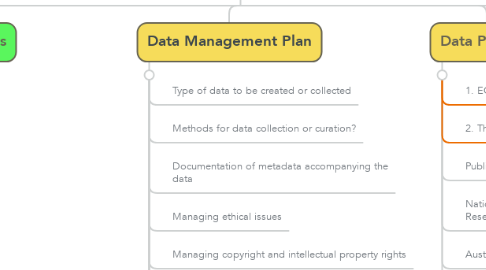
1. Research Data Management
1.1. 1. What is research data?
1.2. 2. Types of research data
1.3. 3. FAIR principles
1.4. 5. Data Management
1.4.1. Why manage data?
1.4.2. Data Management Plan
1.5. 4. Metadata
1.5.1. Metadata Schemas
1.6. 6. Research Data Lifecycle
1.6.1. 6.1 Data Discovery and Planning
1.6.2. 6.2 Data Collection
1.6.3. 6.3 Data Preparation and Analysis
1.6.4. 6.4 Data Publication and Sharing
1.6.5. 6.5 Long term data management
1.7. Organising Data
1.8. Archiving Data
2. Research Ethical Process
2.1. Research Ethics
2.1.1. Ethical Constraints
2.2. Research Integrity
2.2.1. Best Practises
2.3. Sensitive Data
2.4. Joining a new Project
2.5. Project Risks
2.6. Standard Project
2.7. Transfer of external ethical clearance
2.8. Personally Identifiable Information
2.8.1. Direct
2.8.1.1. Names
2.8.1.2. Phone numbers
2.8.1.3. Centrelink number
2.8.2. Indirect
2.8.2.1. Race
2.8.2.2. Income
2.8.2.3. Profession
2.8.3. Geographic
2.8.3.1. Zip code
2.8.3.2. Latitudes and Longitudes
2.8.3.3. Address
2.9. Access restrictions
2.9.1. Embargos
2.9.2. Technological Access Restrictions
2.9.3. Data Use Agreements
2.10. Five Safes Framework
2.10.1. Safe people
2.10.2. safe projects
2.10.3. Safe settings
2.10.4. safe data
2.10.5. safe outputs
2.11. Method of De-identification
2.12. Legislation
2.12.1. Data Policies
2.12.2. Privacy Act 1988
2.13. Funder guidelines and requirements
2.13.1. National Health and Medical Research Council
2.13.1.1. Patents
2.13.2. National Statement on Ethical Conduct in Human Research
2.13.3. The Code
2.13.4. Australian Research Council
2.14. Informed consent
2.15. Confidentiality
2.16. Privacy
2.17. DMP
3. Data Management Plan
3.1. Type of data to be created or collected
3.2. Methods for data collection or curation?
3.3. Documentation of metadata accompanying the data
3.4. Managing ethical issues
3.5. Managing copyright and intellectual property rights
3.6. Data storage and backup during research
3.7. Managing access and security
3.8. Which data should be retained, shared or preserved?
3.9. Long time preservation plan
3.10. Data sharing procedure
3.11. Restrictions on data sharing
3.12. Who will be responsible for Data Management
3.13. Resources to implement the DMP
4. Data Policies
4.1. 1. ECU Data Policies
4.2. 2. The Code
4.3. Publisher's data policies
4.4. National Statement on Ethical conduct in Human Research
4.5. Australian Research Council (ARC)
4.6. National Health and Medical Research Council
5. Data Sharing and Reuse
5.1. Benefits of data sharing
5.2. Challenges to sharing data
5.3. Sharing Sensitive Data
5.4. IP Protection
5.5. Data ownership
5.5.1. Cross Institutional Collaboration
5.5.2. International Collaboration
5.6. Metadata
5.7. Citing Data
5.8. De-identification
5.9. Licensing
5.10. Repositories
5.10.1. Research Online
5.10.2. Other Trustworthy Repositories
